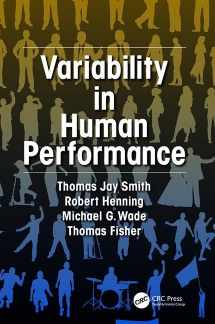
Variability in Human Performance (Human Factors and Ergonomics)
ISBN-13:
9781138076020
ISBN-10:
1138076023
Edition:
1
Author:
Thomas J Smith, Thomas Fisher, Robert A. Henning, Michael G Wade
Publication date:
2017
Publisher:
CRC Press
Format:
Paperback
389 pages
FREE US shipping
Book details
ISBN-13:
9781138076020
ISBN-10:
1138076023
Edition:
1
Author:
Thomas J Smith, Thomas Fisher, Robert A. Henning, Michael G Wade
Publication date:
2017
Publisher:
CRC Press
Format:
Paperback
389 pages
Summary
Variability in Human Performance (Human Factors and Ergonomics) (ISBN-13: 9781138076020 and ISBN-10: 1138076023), written by authors
Thomas J Smith, Thomas Fisher, Robert A. Henning, Michael G Wade, was published by CRC Press in 2017.
With an overall rating of 4.1 stars, it's a notable title among other
books. You can easily purchase or rent Variability in Human Performance (Human Factors and Ergonomics) (Paperback) from BooksRun,
along with many other new and used
books
and textbooks.
And, if you're looking to sell your copy, our current buyback offer is $0.6.
Description
Understanding the conditions under which variability in performance may arise, and the processes related to its emergence, gives us insight into the development of techniques for improving the quality of performance. Variability in Human Performance details the scientific and the practical implications of human performance variability by providing a broad perspective on how and why such variability occurs across a number of disciplinary domains. The text takes an approach that rests upon the idea of context, or design, specificity in performance, namely that variability in performance is closely referenced to design factors in the environment in which performance is occurring. An exploration of the link between variability and related processes, the book introduces a comprehensive framework for understanding human performance variability, presented in terms of how human control of behavior is closely tied to design factors in the performance environment. The authors introduce empirical evidence, as well as practical examples and application areas, in support of this framework. The book begins with coverage of neurobiological and biomechanical basis of movement variability, then examines rich and extensive empirical evidence available for context specificity in cognitive performance and learning, as a basis for cognitive performance variability. The book then reviews the evidence for context specificity in: Student learning Displaced feedback conditions Human error behavior Affective performance Social and team performance The authors also explore work performance as influenced by complex sociotechnical systems and as a basis for performance variability, applying control systems concepts to an interpretation of the nature and basis of performance variability in all of these domains. They conclude by taking an evolutionary perspective on the origins and behavioral significance of human performance variability. The book then provides strategies on how individuals, groups, and organizations can significantly reduce variability in human performance that often leads to systems failures.


We would LOVE it if you could help us and other readers by reviewing the book
Book review

Congratulations! We have received your book review.
{user}
{createdAt}
by {truncated_author}


